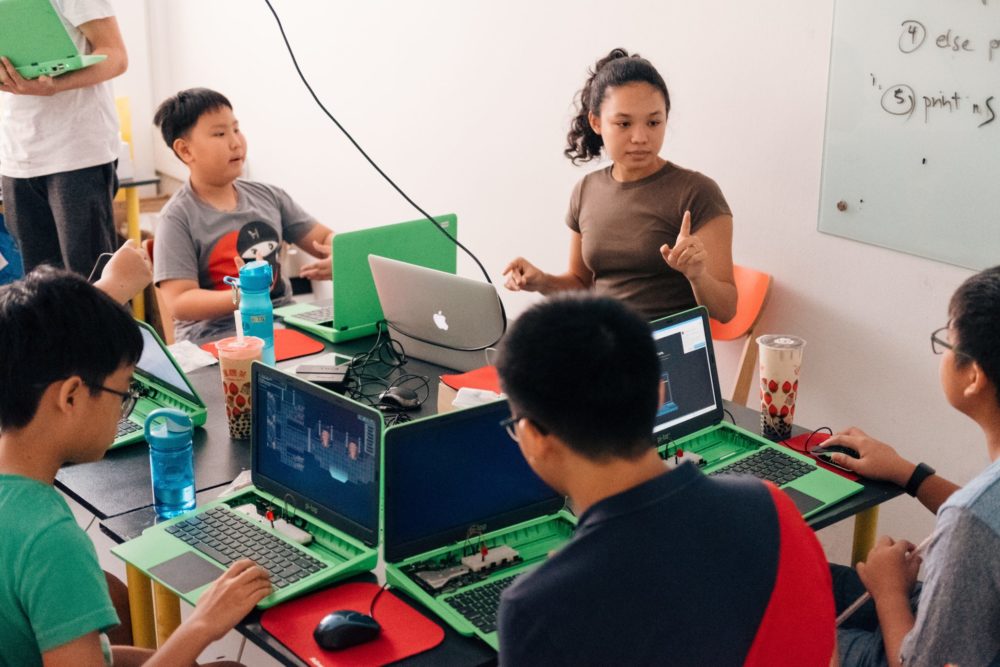Practicing What We Preach: My Journey as a Curriculum Developer at Saturday Kids
June 25, 2021

The idea that you could make a living teaching children to talk to computers sounded laughable a couple of decades ago. But that’s exactly what I’ve been doing for the past 2.5 years.
As I conclude my time with Saturday Kids and embark on the next stage of my career, I’d like to share what it’s like to get kids excited about pursuing big questions, solving problems, and seizing the opportunities of a VUCA (volatile, uncertain, chaotic and ambiguous) world.
Teaching Creativity through Coding
A lot of people see coding as a vocational skill that’s necessary for the future.
Some might opt to teach their children coding out of fear that they might lose out or fall behind. This is the sort of impulse that Saturday Kids does not feed into, and the reason I joined the team.
Our philosophy is to teach children to deal creatively with uncertainty and change. We want both children and parents to realise that being a creative thinker will not only bring them economic rewards but also joy, fulfilment, purpose and meaning. Coding is one of the tools we use to help children access their creative potential.
Balancing the Demands Of The Market with Our Values
Although new technologies have transformed existing industries and led to the creation of new ones, the education industry has not changed much in the last few decades. New technologies are being used in schools, but the core structures and strategies of most schools remain the same. Schools are stuck in an assembly-line mindset where children are delivered bite-sized pieces of the same information that were delivered to their parents and grandparents.
It is challenging for children to develop as creative thinkers when they are mostly occupied with maintaining their positions in the standardised examination rat race. What we at Saturday Kids do is a balancing act between giving the market what it wants, a way for kids to acquire a vocational skill relevant to the rat race while also carving out a space for them to develop as creative thinkers.
Designing learning experiences for these two competing needs is complicated to say the least.
You could easily teach children programming concepts or how to build a website, a game or an app, say that they learnt a future skill and call it a day. It’s a lot harder to teach them how to use these skills to come up with something original of their own. It’s a lot harder to help them understand the relevance of what they learnt in different contexts.
We were motivated to create our year long programmes for that reason. Code Meets World was my response to the question of equipping kids with a future-proofing skill while also giving them the agency to build things they like.
Walking the Talk
The reason I’m passionate about teaching children to seize the opportunities of a VUCA (volatile, uncertain, chaotic and ambiguous) world is because of experiences in my personal and professional life. I turn 25 this year and I’ve worked in programmatic advertising, teaching, software development, coding curriculum design for kids, and I’ll be moving unto curriculum design for the textile and fashion industry. I’m financially independent, live on my own, have a modest business and I’ve had the most wonderful time learning and growing to be the person I am today.
I think all children deserve the opportunity to make a life of their own. A life that they are proud of and which brings them joy and fulfilment. And I believe the best way to do that is help them develop their creative capacities and equip them for life in a rapidly changing world.
The reason we call employees of Saturday Kids big kids is because we are ourselves learning new things and finding our way in the world every day. The values Saturday Kids gave us are the values we want to impart to the children whose creative learning experiences we bring into existence every day.

